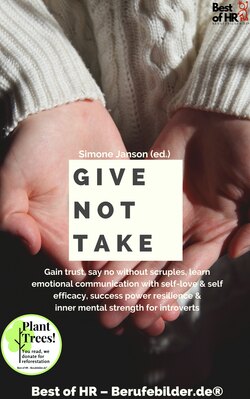Читать книгу Give not Take - Simone Janson - Страница 7
На сайте Литреса книга снята с продажи.
ОглавлениеEmotions in Management: Leadership is emotion management
// By Anne M. Schüller
In sales and marketing, findings from brain research have long been indispensable in order to get the interest and ultimately the “ballot papers” of customers, ie their money. Such knowledge is also extremely useful for managers when it comes to the full commitment of their employees.
The stuff of which feelings are
Selling and leading, both are primarily emotion management: a feeling for the wishes, the often unspoken needs, feelings, worries, fears, longings, hopes and dreams of the people. Only: Wherever the mind rules, access to the emotions is quite cumbersome. A lot of sensitivity is required, because who would like to be caught or exposed in his true feelings?
Emotions are caused by biochemistry and messengers such as serotonin, dopamine, oxytocin, cortisol and adrenaline. Their distribution is effected via the brain, but we perceive them as physical reactions, for example in the area of the internal organs. This is what we call abdominal feeling. The famous butterflies in the belly are an example of this.
Even though we are not always aware of this, we always feel. And most of these feelings are public. 50 mimic muscles reflect our inner life. Whoever can read this language, they reveal something about our constant tension curve between plus and minus, pleasure and pain, joy and sadness, happiness and fear, love and hatred.
Good feelings make the saying yes
Well-being triggers visibly pleasant feelings and these in turn lead to positive thinking and thus to positive decisions. Being in such a state has other benefits. We become more open and thus more creative. We become more agile and move to action. And we see the world a bit through the pink glasses - just like a lover who sees only the good side and mildly overlooks small weaknesses.
Each feeling has a certain 'temperature' and a certain 'loudness'. This is different depending on the situation and the person, because each brain is differently built. One can express loudly his delight. The other will pack his quiet enthusiasm into a treasure chest which belongs only to him. We experience new feelings longer and more intensively, but all too well-known are weak impulses: boredom comes and life becomes desolate.
Time seems to creep when we want it to go away fast and it speeds us away if we wish the moment never ended. The 'fluid of thought', the perceived time, slows down in fear and sadness and accelerates in the state of happiness. Of course, what seems a bit paradoxical at first makes sense: in stressful situations, our brains slow down our perception, thus providing themselves with time to react. And in the fast moments of delights the 'hunger' should be maintained after the next kick.
Our brain wants a happy ending
To all those who believe steadfastly in the positive, brain research is right. Whenever we have thought or done something that deserves a reward from the perspective of the brain, happiness hormones are poured out. This strategy of nature not only helps us to survive, but can also improve our quality of life remarkably. People like to do what a reward is promised.
We are always looking for good feelings, at home as well as at work. Even when buying, we only really decide for or against something when we have a 'good feeling' about it. Those who bathe in positive emotions and are in a good mood are certain to buy. On the other hand, you cannot sell anything to people who are in a bad mood! Internally, something when 'selling' ideas, the same applies
Overcoming negative feelings - no longer needing to worry or worry because the happy ending is approaching - is the ultimate goal. Our brain wants the happy ending, indirectly about avoiding the bad and directly about the search for happiness. Even opposing feelings like the hate love, the joy of harm or the joy of joy have also a positive component: The little joy, the great fear to defy or the bliss to escape the negative (once again).
Doing good is rewarded with happiness
Doing good makes us happy. 'Helper's high' is called this condition. For example, US scientists have found that charitable donations to a good cause mobilize the same brain areas that are active even when we expect an increase in their own assets.
It is not for nothing that many people with whom life has meant well become benefactors themselves. You personally look after the needy or set up foundations for them. In this way, they can feel first-hand that altruistic behavior brings the best feelings by far. So companies should not only focus on 'Social responsability' (CSR) because it's fashionable, but above all because it is good for their employees.
In the end, it should be a business goal to make the world a little better. And for executive karrings, only human translators can be considered. Some managers do it quite well. The other is to be withdrawn immediately.
